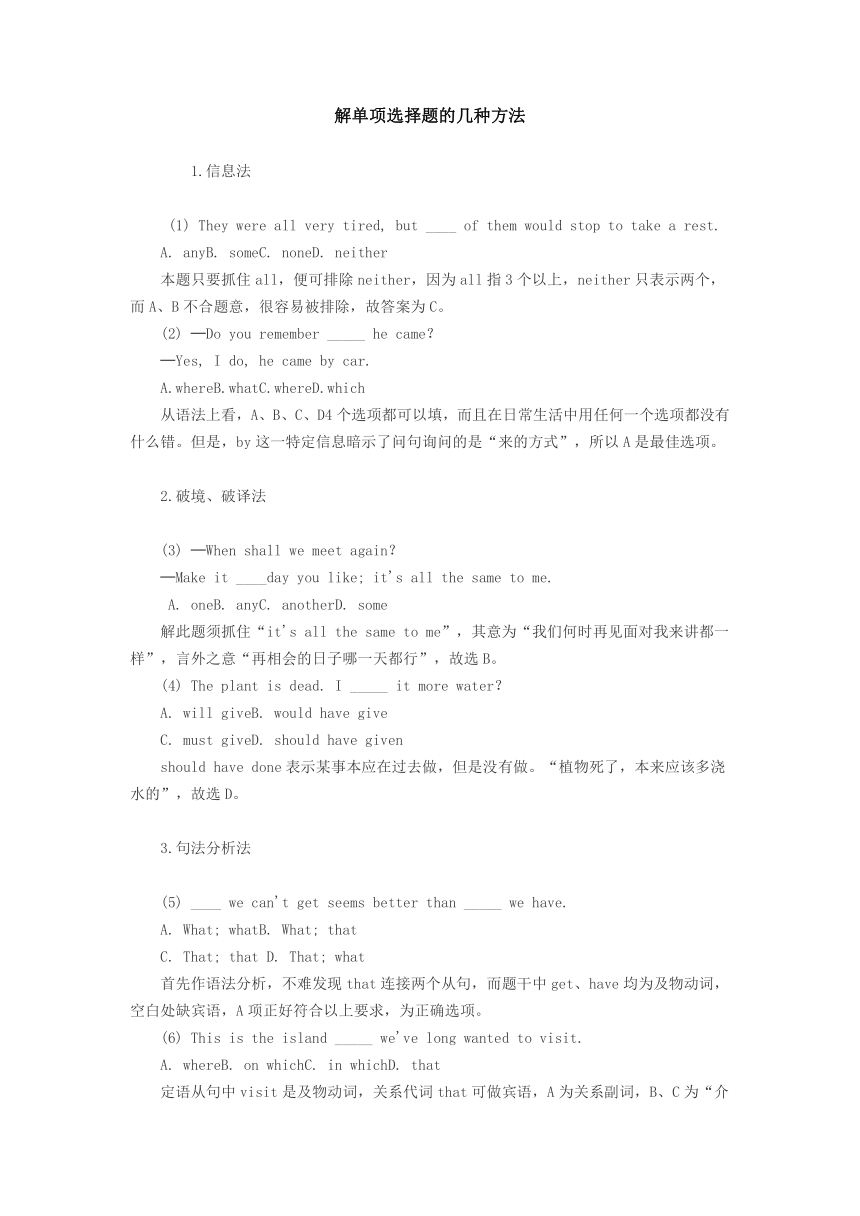中考英语复习:解单项选择题的几种方法举例讲解(教师版)
文档属性
| 名称 | 中考英语复习:解单项选择题的几种方法举例讲解(教师版) |  | |
| 格式 | doc | ||
| 文件大小 | 33.5KB | ||
| 资源类型 | 试卷 | ||
| 版本资源 | 通用版 | ||
| 科目 | 英语 | ||
| 更新时间 | 2022-03-29 15:20:07 | ||
图片预览

文档简介
解单项选择题的几种方法
1.信息法
(1) They were all very tired, but ____ of them would stop to take a rest.
A. anyB. someC. noneD. neither
本题只要抓住all,便可排除neither,因为all指3个以上,neither只表示两个,而A、B不合题意,很容易被排除,故答案为C。
(2) ─Do you remember _____ he came?
─Yes, I do, he came by car.
A.whereB.whatC.whereD.which
从语法上看,A、B、C、D4个选项都可以填,而且在日常生活中用任何一个选项都没有什么错。但是,by这一特定信息暗示了问句询问的是“来的方式”,所以A是最佳选项。
2.破境、破译法
(3) ─When shall we meet again?
─Make it ____day you like; it's all the same to me.
A. oneB. anyC. anotherD. some
解此题须抓住“it's all the same to me”,其意为“我们何时再见面对我来讲都一样”,言外之意“再相会的日子哪一天都行”,故选B。
(4) The plant is dead. I _____ it more water?
A. will giveB. would have give
C. must giveD. should have given
should have done表示某事本应在过去做,但是没有做。“植物死了,本来应该多浇水的”,故选D。
3.句法分析法
(5) ____ we can't get seems better than _____ we have.
A. What; whatB. What; that
C. That; that D. That; what
首先作语法分析,不难发现that连接两个从句,而题干中get、have均为及物动词,空白处缺宾语,A项正好符合以上要求,为正确选项。
(6) This is the island _____ we've long wanted to visit.
A. whereB. on whichC. in whichD. that
定语从句中visit是及物动词,关系代词that可做宾语,A为关系副词,B、C为“介词+关系代词”,其作用相当于关系副词,故答案为D。
4.时态、语态分析法
(7) Helen _____ her keys in the room so she had to wait until her son _____ home.
A. has left; comesB. left; had come
C. had left; came D. had left; would come
首先作时态分析,从句so she had to wait...为过去式,而had to意为“不得不”,从而可知主句动作应先于从句动作发生,而且已造成了影响,故主句时态必须用过去完成时,排除A、B;从句里wait为延续性动词,until用在肯定句里表明“……直到……为止”,在其引导的时间状语从句中,用一般过去时表示过去将来时的动作,故选C。
(8) When we came here this time last year, a new road _____.
A. was buildingB. has built
C. was being built D. has been built
第一句语境提示“this time last year”从而可推断第二句必须用过去进行时,而第二句主语为road,故必须用被动语态,所以答案为C。
5.排除法
(9) If there were no exa-
minations, she should have __ at school.
A. the happiest time
B. a more happier time
C. much happiest time
D. a much happier time
B、C的形式明显有错,happier已是比较级无需再加more;而最高级前应用the。接下重点来考虑A、D,此题没有三者以上的范围,仅是“有考试”与“没有考试”两种情况的比较,所以推测D为正确答案,much可修饰比较级。
6.综合法
(10) ─How did you find your visit to museum.
─I enjoyed it very much. It was ___than I expected.
A. far more interesting
B. even much interesting
C. so more interesting
D. a lot much interesting
题中than说明该题为比较级句型。B、D属形容词原级,可排除;而C项中so不可跟more interesting连用,自然排除。那么剩下的A代入验证后,more interesting可与far连用,从而可以确定为正确答案。
7.排除母语干扰法
(11) ─Please don't make any noise.
─_____. I'll be as quiet as a mouse.
A. Yes, I won't B. No, I won't
C. No, I'll D. Yes, I'll
首先,A、C答语形式相悖应排除,在简略答语中,Yes汉语译为“不”,No译为“是”。第一句语境为否定,第二句语境为“我将静如鼠,不再吵闹”。前后意义一致,故答案为B。
8.推算法
(12) Tom is seventeen years old. Jack is three years older than Tom and two years younger than Tod. Tod is _____.
A. eighteenB. nineteenC. twenty-twoD. sixteen
汤姆17岁,杰克20岁,而杰克比托德小两岁,所以托德是22岁,经过这样一推算,就知道“C”是正确答案了。
1.信息法
(1) They were all very tired, but ____ of them would stop to take a rest.
A. anyB. someC. noneD. neither
本题只要抓住all,便可排除neither,因为all指3个以上,neither只表示两个,而A、B不合题意,很容易被排除,故答案为C。
(2) ─Do you remember _____ he came?
─Yes, I do, he came by car.
A.whereB.whatC.whereD.which
从语法上看,A、B、C、D4个选项都可以填,而且在日常生活中用任何一个选项都没有什么错。但是,by这一特定信息暗示了问句询问的是“来的方式”,所以A是最佳选项。
2.破境、破译法
(3) ─When shall we meet again?
─Make it ____day you like; it's all the same to me.
A. oneB. anyC. anotherD. some
解此题须抓住“it's all the same to me”,其意为“我们何时再见面对我来讲都一样”,言外之意“再相会的日子哪一天都行”,故选B。
(4) The plant is dead. I _____ it more water?
A. will giveB. would have give
C. must giveD. should have given
should have done表示某事本应在过去做,但是没有做。“植物死了,本来应该多浇水的”,故选D。
3.句法分析法
(5) ____ we can't get seems better than _____ we have.
A. What; whatB. What; that
C. That; that D. That; what
首先作语法分析,不难发现that连接两个从句,而题干中get、have均为及物动词,空白处缺宾语,A项正好符合以上要求,为正确选项。
(6) This is the island _____ we've long wanted to visit.
A. whereB. on whichC. in whichD. that
定语从句中visit是及物动词,关系代词that可做宾语,A为关系副词,B、C为“介词+关系代词”,其作用相当于关系副词,故答案为D。
4.时态、语态分析法
(7) Helen _____ her keys in the room so she had to wait until her son _____ home.
A. has left; comesB. left; had come
C. had left; came D. had left; would come
首先作时态分析,从句so she had to wait...为过去式,而had to意为“不得不”,从而可知主句动作应先于从句动作发生,而且已造成了影响,故主句时态必须用过去完成时,排除A、B;从句里wait为延续性动词,until用在肯定句里表明“……直到……为止”,在其引导的时间状语从句中,用一般过去时表示过去将来时的动作,故选C。
(8) When we came here this time last year, a new road _____.
A. was buildingB. has built
C. was being built D. has been built
第一句语境提示“this time last year”从而可推断第二句必须用过去进行时,而第二句主语为road,故必须用被动语态,所以答案为C。
5.排除法
(9) If there were no exa-
minations, she should have __ at school.
A. the happiest time
B. a more happier time
C. much happiest time
D. a much happier time
B、C的形式明显有错,happier已是比较级无需再加more;而最高级前应用the。接下重点来考虑A、D,此题没有三者以上的范围,仅是“有考试”与“没有考试”两种情况的比较,所以推测D为正确答案,much可修饰比较级。
6.综合法
(10) ─How did you find your visit to museum.
─I enjoyed it very much. It was ___than I expected.
A. far more interesting
B. even much interesting
C. so more interesting
D. a lot much interesting
题中than说明该题为比较级句型。B、D属形容词原级,可排除;而C项中so不可跟more interesting连用,自然排除。那么剩下的A代入验证后,more interesting可与far连用,从而可以确定为正确答案。
7.排除母语干扰法
(11) ─Please don't make any noise.
─_____. I'll be as quiet as a mouse.
A. Yes, I won't B. No, I won't
C. No, I'll D. Yes, I'll
首先,A、C答语形式相悖应排除,在简略答语中,Yes汉语译为“不”,No译为“是”。第一句语境为否定,第二句语境为“我将静如鼠,不再吵闹”。前后意义一致,故答案为B。
8.推算法
(12) Tom is seventeen years old. Jack is three years older than Tom and two years younger than Tod. Tod is _____.
A. eighteenB. nineteenC. twenty-twoD. sixteen
汤姆17岁,杰克20岁,而杰克比托德小两岁,所以托德是22岁,经过这样一推算,就知道“C”是正确答案了。
同课章节目录
- 词法
- 名词
- 动词和动词短语
- 动词语态
- 动词时态
- 助动词和情态动词
- 非谓语动词
- 冠词
- 代词
- 数词和量词
- 形容词副词及其比较等级
- 介词和介词短语
- 连词和感叹词
- 构词法
- 相似、相近词比较
- 句法
- 陈述句
- 一般疑问句和否定疑问句
- 特殊疑问句及选择疑问句
- 反意疑问句
- 存在句(There be句型)
- 宾语从句
- 定语从句
- 状语从句
- 主谓一致问题
- 简单句
- 并列句
- 复合句
- 主谓一致
- 主、表语从句
- 名词性从句
- 直接引语和间接引语
- 虚拟语气
- 感叹句
- 强调句
- 倒装句
- 祈使句
- 句子的成分
- 句子的分类
- 题型专区
- 单项选择部分
- 易错题
- 完形填空
- 阅读理解
- 词汇练习
- 听说训练
- 句型转换
- 补全对话
- 短文改错
- 翻译
- 书面表达
- 任务型阅读
- 语法填空
- 其他资料
